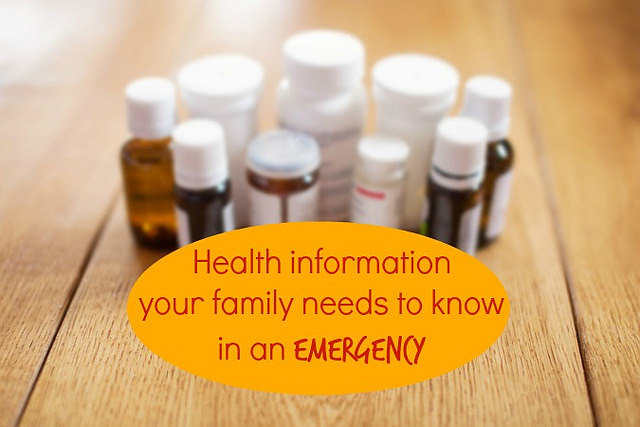 Certain things are better kept private. Your health information should not be one of them, at least not for those close to you. Even if you find it embarrassing or uncomfortable to talk about, you will be glad you spoke up if you are ever in an emergency. Access to your health information can sometimes be the difference between life and death.
Here is what your family needs to know in case of emergency.
Allergies. Allergic reactions run the gamut from minor rashes to difficulty breathing. In one case, you could suffer an annoyance, in the other a fatal event. Having an allergy list at the ready can decrease the risk that you are exposed to treatments that could lead to complications.
Medical conditions. Different medical conditions require targeted treatment approaches. A summary of your health issues can guide the emergency team in their approach to your care. For example, a history of diabetes would let them know to watch your blood sugar more frequently.
Medications, including supplements. A list of medications provides more information to your providers than you realize. Drug interactions are all too common, and yes, too few people report taking vitamin supplements to their doctors. Just because a supplement is “natural” does not mean that it is safe or does not cause drug interactions. Knowing what medications you take may also change which ones an emergency team decides to use for your condition.
Certain medications can have side effects that could affect your care plan. For example, it would be important for a surgeon to know that you are on blood thinners for atrial fibrillation since this would increase your bleeding risk during a procedure.
List of doctors and healthcare providers. The more health information that can be accessed during an emergency the better. Who knows more details about your health than your own doctor? A list of your healthcare providers allows an emergency team to call out for more health information as they need it.
End of life wishes. In the event that you suffer a serious complication and it is unclear if you will recover, your family ought to know your end of life wishes. This can be relayed through a living will or a healthcare proxy. You can assign a durable power of attorney for health care purposes by meeting with a lawyer or by completing forms on your own. These are often available through state agencies or other private organizations.
Emergency response teams have two things in mind when they meet you. One, they want to keep you alive. Two, they want to minimize complications. By sharing health information with family and loved ones, you give emergency responders what they need to do their job and that is good news for everyone.
Certain things are better kept private. Your health information should not be one of them, at least not for those close to you. Even if you find it embarrassing or uncomfortable to talk about, you will be glad you spoke up if you are ever in an emergency. Access to your health information can sometimes be the difference between life and death.
Here is what your family needs to know in case of emergency.
Allergies. Allergic reactions run the gamut from minor rashes to difficulty breathing. In one case, you could suffer an annoyance, in the other a fatal event. Having an allergy list at the ready can decrease the risk that you are exposed to treatments that could lead to complications.
Medical conditions. Different medical conditions require targeted treatment approaches. A summary of your health issues can guide the emergency team in their approach to your care. For example, a history of diabetes would let them know to watch your blood sugar more frequently.
Medications, including supplements. A list of medications provides more information to your providers than you realize. Drug interactions are all too common, and yes, too few people report taking vitamin supplements to their doctors. Just because a supplement is “natural” does not mean that it is safe or does not cause drug interactions. Knowing what medications you take may also change which ones an emergency team decides to use for your condition.
Certain medications can have side effects that could affect your care plan. For example, it would be important for a surgeon to know that you are on blood thinners for atrial fibrillation since this would increase your bleeding risk during a procedure.
List of doctors and healthcare providers. The more health information that can be accessed during an emergency the better. Who knows more details about your health than your own doctor? A list of your healthcare providers allows an emergency team to call out for more health information as they need it.
End of life wishes. In the event that you suffer a serious complication and it is unclear if you will recover, your family ought to know your end of life wishes. This can be relayed through a living will or a healthcare proxy. You can assign a durable power of attorney for health care purposes by meeting with a lawyer or by completing forms on your own. These are often available through state agencies or other private organizations.
Emergency response teams have two things in mind when they meet you. One, they want to keep you alive. Two, they want to minimize complications. By sharing health information with family and loved ones, you give emergency responders what they need to do their job and that is good news for everyone. Certain things are better kept private. Your health information should not be one of them, at least not for those close to you. Even if you find it embarrassing or uncomfortable to talk about, you will be glad you spoke up if you are ever in an emergency. Access to your health information can sometimes be the difference between life and death.
Here is what your family needs to know in case of emergency.
Allergies. Allergic reactions run the gamut from minor rashes to difficulty breathing. In one case, you could suffer an annoyance, in the other a fatal event. Having an allergy list at the ready can decrease the risk that you are exposed to treatments that could lead to complications.
Medical conditions. Different medical conditions require targeted treatment approaches. A summary of your health issues can guide the emergency team in their approach to your care. For example, a history of diabetes would let them know to watch your blood sugar more frequently.
Medications, including supplements. A list of medications provides more information to your providers than you realize. Drug interactions are all too common, and yes, too few people report taking vitamin supplements to their doctors. Just because a supplement is “natural” does not mean that it is safe or does not cause drug interactions. Knowing what medications you take may also change which ones an emergency team decides to use for your condition.
Certain medications can have side effects that could affect your care plan. For example, it would be important for a surgeon to know that you are on blood thinners for atrial fibrillation since this would increase your bleeding risk during a procedure.
List of doctors and healthcare providers. The more health information that can be accessed during an emergency the better. Who knows more details about your health than your own doctor? A list of your healthcare providers allows an emergency team to call out for more health information as they need it.
End of life wishes. In the event that you suffer a serious complication and it is unclear if you will recover, your family ought to know your end of life wishes. This can be relayed through a living will or a healthcare proxy. You can assign a durable power of attorney for health care purposes by meeting with a lawyer or by completing forms on your own. These are often available through state agencies or other private organizations.
Emergency response teams have two things in mind when they meet you. One, they want to keep you alive. Two, they want to minimize complications. By sharing health information with family and loved ones, you give emergency responders what they need to do their job and that is good news for everyone.
Certain things are better kept private. Your health information should not be one of them, at least not for those close to you. Even if you find it embarrassing or uncomfortable to talk about, you will be glad you spoke up if you are ever in an emergency. Access to your health information can sometimes be the difference between life and death.
Here is what your family needs to know in case of emergency.
Allergies. Allergic reactions run the gamut from minor rashes to difficulty breathing. In one case, you could suffer an annoyance, in the other a fatal event. Having an allergy list at the ready can decrease the risk that you are exposed to treatments that could lead to complications.
Medical conditions. Different medical conditions require targeted treatment approaches. A summary of your health issues can guide the emergency team in their approach to your care. For example, a history of diabetes would let them know to watch your blood sugar more frequently.
Medications, including supplements. A list of medications provides more information to your providers than you realize. Drug interactions are all too common, and yes, too few people report taking vitamin supplements to their doctors. Just because a supplement is “natural” does not mean that it is safe or does not cause drug interactions. Knowing what medications you take may also change which ones an emergency team decides to use for your condition.
Certain medications can have side effects that could affect your care plan. For example, it would be important for a surgeon to know that you are on blood thinners for atrial fibrillation since this would increase your bleeding risk during a procedure.
List of doctors and healthcare providers. The more health information that can be accessed during an emergency the better. Who knows more details about your health than your own doctor? A list of your healthcare providers allows an emergency team to call out for more health information as they need it.
End of life wishes. In the event that you suffer a serious complication and it is unclear if you will recover, your family ought to know your end of life wishes. This can be relayed through a living will or a healthcare proxy. You can assign a durable power of attorney for health care purposes by meeting with a lawyer or by completing forms on your own. These are often available through state agencies or other private organizations.
Emergency response teams have two things in mind when they meet you. One, they want to keep you alive. Two, they want to minimize complications. By sharing health information with family and loved ones, you give emergency responders what they need to do their job and that is good news for everyone.
